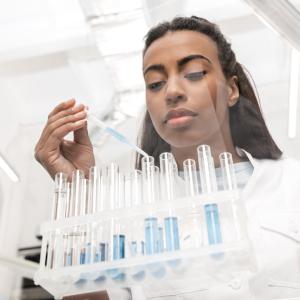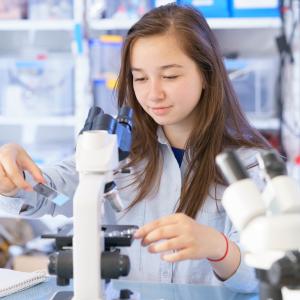
View the NIH Office of Intramural Training and Education (OITE) website and visual guide to learn about training programs across NIH that are available for high school and college students. Find out how to apply for high school summer internships, the Community College Summer Enrichment Program (CCSEP), the College Summer Opportunities to Advance Research (CSOAR) program, the Undergraduate Scholarship Program (UGSP), the general Summer Internship Program in Biomedical Research (for college students and above), and more.
If you are interested in research on communication disorders, learn more about labs in the NIDCD Intramural Research Program on the NIDCD Intramural Research Program page and the Scientific Faculty page. After submitting your application through the central NIH application portal, contact principal investigators (PIs) directly to inquire about training opportunities in specific laboratories.
Additional programs include the High School Scientific Training and Enrichment Program (HiSTEP) and HiSTEP 2.0, the Community College Summer Enrichment Program (CCSEP), the College Summer Opportunities to Advance Research (C-SOAR) program, the Undergraduate Scholarship Program (UGSP), and the AMGEN Scholars Program.

The Postbaccalaureate Intramural Research Training Award (IRTA) program is among the most popular training programs at the NIH. See the NIH Office of Intramural Training and Education website and visual guide to learn about how to apply for this program available to college graduates (those with a bachelor’s degree).
To learn more about labs in the NIDCD Intramural Research Program, visit the NIDCD Intramural Research Program page and the Scientific Faculty page. After submitting your application through the central NIH application portal, contact principal investigators (PIs) directly to inquire about training opportunities in specific laboratories.
Additional programs include the NIH Academy on Health Disparities and the NIH-OITE Postbac Enrichment Program.
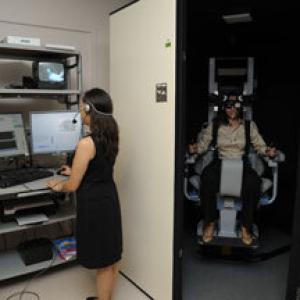
Through the NIH Graduate Partnerships Program, graduate students may perform their dissertation research in an NIDCD intramural laboratory, as well as the NIDCD Audiology Unit, while enrolled in any university in the world.
The NIH Medical Scientist Partnership Program (FM1) supports highly promising predoctoral students during their mentored dissertation research and clinical training. Students must be matriculated in (a) a formal combined M.D./Ph.D. program or other combined-doctoral degree training program (e.g., Au.D./Ph.D.) or (b) a clinical doctoral degree program plus a separate accredited Ph.D. program at their clinical degree school or other university. Students conduct their clinical degree education at their home institution and the Ph.D. portion of their education/experience in research laboratories in the NIH Intramural Research Program (IRP), including NIDCD’s Division of Intramural Research, through participation in the NIH Graduate Partnership Program.
To learn more about labs in the NIDCD Intramural Research Program, visit the NIDCD Intramural Research Program page and the Scientific Faculty page. Contact principal investigators (PIs) directly to inquire about training opportunities in specific laboratories.
Ph.D. graduate students performing research within the NIH intramural program may apply for the NIH Blueprint and BRAIN Initiative Diversity Specialized Predoctoral to Postdoctoral Advancement in Neuroscience (D-SPAN) Award (F99/K00). This two-phase award supports the completion of the doctoral dissertation (F99 phase) and the transition to strong neuroscience research postdoctoral positions (K00 phase).
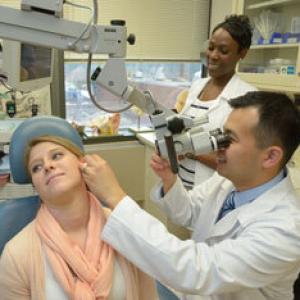
The NIH is home to more than 3,000 postdoctoral fellows, creating a rich environment for research collaboration and career development. Postdoctoral training opportunities with federal funding are available across the NIDCD.
The NIDCD Robert Wenthold Postdoctoral Research Fellowship also provides funding, along with additional resources and an opportunity for cross-disciplinary training, with the goal of fostering independent research careers in the fields of deafness and other communication disorders.
To learn more about labs in the NIDCD Intramural Research Program, visit the NIDCD Intramural Research Program page and the Scientific Faculty page. Interested trainees should contact principal investigators (PIs) directly to inquire about postdoctoral opportunities in specific laboratories.
Some of these funding opportunities may be but are not required to be pursued before a postdoctoral trainee joins an intramural laboratory.
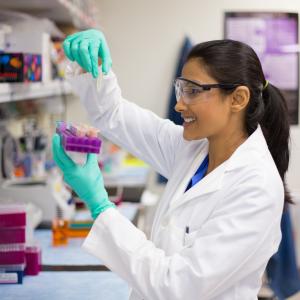
The NIDCD Otolaryngology Surgeon-Scientist Program is a junior faculty career development program that enables the candidate to design and implement a plan integrating basic scientific and clinical research.
The NIH Lasker Clinical Research Scholars Program (Si2/R00 Clinical Trial Optional) supports research activities during the early careers of independent clinical researchers by offering a unique bridge between NIH intramural (on-campus) and extramural (off-campus) research.
Additional programs include the Independent Research Scholar Program and the NIH Distinguished Scholars Program (also recruiting tenured investigators).

Project SEARCH is a program that provides education and training to young adults with intellectual and developmental disabilities. The NIH, including the Clinical Center, offers a 30-week internship in collaboration with Project SEARCH.



